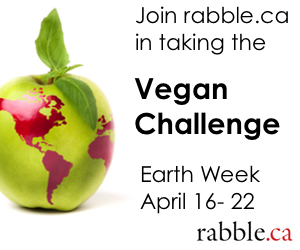Follow rabble staff and contributors as they take the 2013 Vegan Challenge in our rabble Vegan Challenge Diary, where participants will chronicle their experiences eating vegan throughout the week!
My commitment to join rabble’s Vegan Challenge lasted exactly half an hour. Yesterday morning, as my 20-month-old chomped happily on his oat bran square cereal and frozen strawberries, I helped myself to some Rice Krispies, banana and then promptly poured milk all over them as the rice milk I purchased for the occasion sat unopened. Abandoned. Jilted.
I was ready to renew my vows for lunch and dinner (avocado and cucumber sushi followed by a cauliflower and pea curry), but I think I already knew I wouldn’t make it the whole week. Part of the reason is that I’m both a creature of custom and a practicing omnivore, and the chances of changing my daily routine, my shopping patterns as well as my eating habits for a whole week were low to begin with.
But the real reason, I have to confess, is that my heart just isn’t in it.
I wasn’t given much help, in my defence. I told my partner I was going to give the Vegan Challenge a real shot this year, and asked her if she wanted to participate as well. She either saw through my charade before I did or she simply doesn’t care to support me when I need her the most. “Absolutely not,” she answered without pause.
We have a toddler, of course, who’s bred on milk, cheese and salmon and isn’t too keen on performative diet changes in the interest of public awareness. Plus he seems to hate vegetables right now. So changing the diet of our whole household was not an option. But my partner also doesn’t have much faith in the Vegan Challenge as an agent of social change in general. You’ve heard the criticisms; maybe you’ve voiced them yourself: it’s posturing, ahistorical, superficial.
I have them too. But there are two arguments in favour of adopting veganism that made me want to take up the challenge this year. One, such a radical change in diet makes you question every life choice regarding food: grocery shopping, meal preparation, when it’s feasible to eat out, and so on. In an age where food production is increasingly industrializing at a breathless pace (and none of the consumer-based solutions — eat local, eat organic, eat vegan — have slowed it), taking a moment to think about where your breakfast actually comes from (to paraphrase David Harvey) is revelatory.
And this argument leads to the second, which was first voiced to me by a colleague and comrade of mine, an activist for animal-rights group Liberation BC. Simply put, rearing animals for food, for profit, is barbaric. Localvore, ethical meat practices won’t fix this. Any belief to the contrary is delusional.
It’s a forceful point, and one that I’m inclined to agree with. While I do try to buy organic and local food whenever possible, I’ve come to think of it as yet another class marker deployed to both morally chastise those who can’t afford these products, while ensuring their diet isn’t as nutritious (and in many cases as delicious) as mine.
And yet — the question I always want to ask remains: why do animals get all the press? Isn’t all food production for profit barbaric? Domestic farm work is one of the worst exploiters of migrant workers. General farm work is listed as the largest occupational group in the disgraceful Temporary Foreign Worker program for 2011, which has ballooned under the Harper Government. Harvesting labourers, food service workers, cooks and greenhouse workers are all in the top six.
As a former line cook, I can attest personally that the food service industry is one of the worst sources of exploitative, precarious and miserable labour which routinely hands immigrants and refugees the most undesirable work. This can’t be disentangled from our dietary choices since the apparatus through which food is delivered — whether that’s grocery stores, farmers markets or restaurants — is essential to its ethical character. We know this because 15 per cent of the carbon released in food production, from pasture to plate, comes from driving to the supermarket or restaurant (pdf).
I don’t see how my neglected rice milk helps those workers and their families. That said, I don’t see how buying grain-fed, hundred-mile sirloin steaks helps them either. I realize that the motivation for the Vegan Challenge is the urge to stop climate change, a goal which I wholeheartedly support. But until we focus on the profit, rather than the protein, I can’t see how we can generate a truly ethical diet.
I look forward to the comments and debate we’ll see on rabble.ca in the coming week and I hope to check in later this week with an update to see if I can make it past 7:00 a.m. one of these days.




